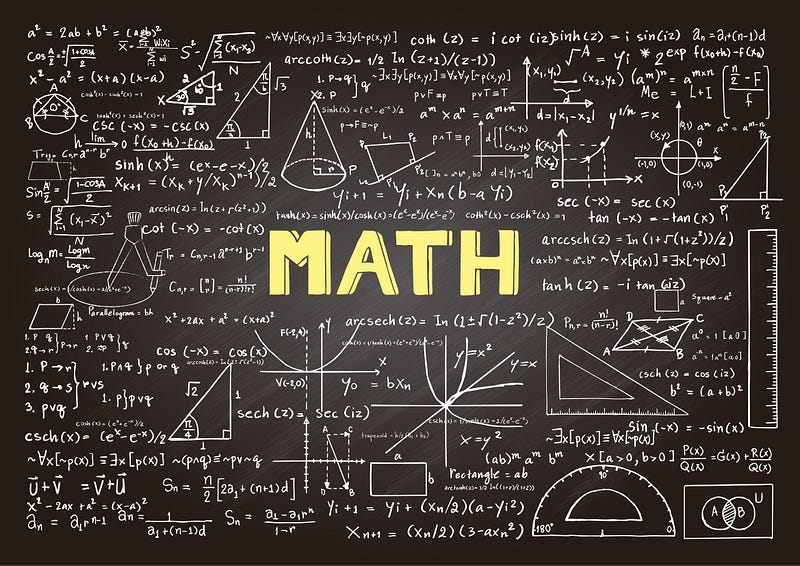Unlocking Mathematics for Data Science: 5 Essential Resources
Written on
Chapter 1: Introduction to Math in Data Science
If you're aspiring to enter the field of data science but lack a robust math background, you've come to the right place.

A frequently asked question from future data scientists is, "How much math is necessary for machine learning?" When I embarked on my journey to learn data science, I was uncertain about the math skills I would need for an entry-level position. I dedicated considerable time to studying topics such as calculus, linear algebra, and statistics.
Upon securing my first job in data science, I discovered that the math required in the industry was far less extensive than I had anticipated. Most organizations typically use machine learning models to address similar business challenges, which means that you often don't need to create algorithms from scratch. Instead, you can leverage existing solutions tailored to your specific needs.
However, possessing at least a fundamental understanding of how these algorithms operate is beneficial. For instance, gradient descent, a method used to determine the optimal slope in linear regression models, is rooted in calculus. Grasping how the line of best fit is computed can enhance your insights.
Linear algebra is also pivotal, particularly in preparing data for modeling and implementing dimensionality reduction techniques. If you're interested in delving into deep learning, you'll need to become familiar with matrix manipulation.
Lastly, statistics is the cornerstone of mathematics that aspiring data scientists must master. Analyzing data trends, formulating hypotheses, and converting observations into valuable insights all rely on statistical methods. This area is crucial for anyone aiming to enter the data science workforce.
When I initially grasped these concepts, I spent considerable time performing manual calculations, learning to differentiate, integrate, and solve linear equations. However, this is not essential for learning data science today. Various software tools can handle these calculations, and what's truly needed is a high-level, intuitive grasp of these mathematical principles.
This guidance is primarily for those looking to work in the industry. If your goal is to become a machine learning researcher or pursue an academic path, the mathematical requirements will be significantly more demanding, as you'll be developing new solutions from the ground up.
In this article, I will share five free resources to help you learn the math necessary for machine learning, including YouTube videos, online courses, and textbooks.
Chapter 2: Top Resources for Learning Math
3Blue1Brown’s Linear Algebra Series
3Blue1Brown is a renowned YouTube channel that employs a visual methodology to simplify complex mathematical concepts. Their linear algebra series covers essential topics such as vectors, linear transformations, and eigenvectors while emphasizing intuitive understanding over rote memorization.
This series is ideal for those looking to grasp the "why" behind linear algebra rather than just memorizing formulas.
3Blue1Brown’s Calculus Series
This second resource from 3Blue1Brown provides an accessible introduction to calculus. You'll learn about derivatives, the chain rule, and implicit differentiation, all of which are vital for understanding the gradient descent algorithm.
3Blue1Brown’s Deep Learning Series
Tailored for students interested in artificial intelligence, this series explores the mechanics of neural networks and their learning processes. You'll gain insights into the backpropagation algorithm and the underlying calculus concepts.
An Introduction to Statistical Learning
This introductory statistics textbook is an invaluable resource for machine learning enthusiasts. It’s available for free online and is perfect for those who have implemented algorithms like linear regression but want to deepen their understanding of their workings.
Statistics 110 by Harvard University
This YouTube lecture series from Harvard is one of the most comprehensive resources for learning statistics and probability. Covering topics from basic probability axioms to advanced tests like Chi-Square and T-tests, it’s designed for learners with little to no prior background in statistics.
The resources listed above are fantastic starting points for exploring the mathematics essential for machine learning. They provide a solid conceptual foundation that will enhance your understanding of the models you work with daily.
If time is limited, I recommend prioritizing "An Introduction to Statistical Learning," as the concepts discussed in this book are highly relevant to your work as a data scientist.
Thank you for reading!